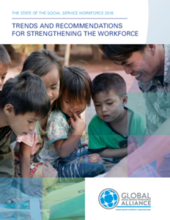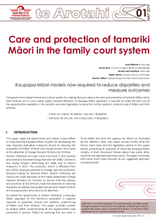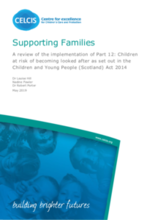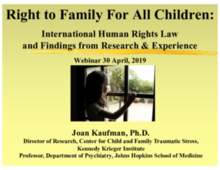Displaying 371 - 380 of 1796
The article examines from a comparative perspective how Sweden and Germany reacted to the unprecedented increase in unaccompanied asylum-seeking children (UASC) in 2015. By illustrating the reactions of two countries, the study shows that an unprecedented wave of refugees/asylum seekers can trigger both more incremental, adaptive and drastic transformative policy changes.
This article aims to unpack the reasons that Sweden's incorporation of legal measures to secure the rights recognised in the Convention on the Rights of the Child has been the subject of a lengthy and contentious debate.
This 4th annual report from the Global Social Service Workforce Alliance includes a multi-country, four region review of the state of the social service workforce.
This paper urges the government and nation of New Zealand to give effect to long-standing Kaupapa Māori models for developing the new required evaluation measures aimed at reducing the disparities for Māori children and young persons who come to the attention of Oranga Tamariki Ministry for Children.
The purpose of this research was to gather opinions on, and experiences of, implementation of Part 12: Services in relation to children at risk of becoming looked after, etc. of the Children and Young People (Scotland) Act 2014.
This presentation, given at Disability Rights International and the European Network on Independent Living's webinar on the right of all children to a family, outlines the Consensus Statement Position on Group Care for Children and Adolescents of the American Orthopsychiatric Association and reviews the research on the detrimental effects of institutionalization on children from the Bucharest Early Intervention Project and other studies.
This chapter from the book Re-Visioning Public Health Approaches for Protecting Children critiques historical and contemporary child protection approaches that are viewed as replicating the colonialist practices of child removal and destruction of families/parenting and communities. Using Australia and Canada as examples, it focuses upon three different sources of the disadvantage and distress that Indigenous communities typically experience: the impacts of Colonisation; intergenerational trauma; and the ongoing social, economic, legal and political inequalities that stem from deep-seated inequity.
This chapter from the book Re-Visioning Public Health Approaches for Protecting Children, drawing on recent international empirical research, illustrates the perspectives of key stakeholders in the child welfare and protection services: Children, caregivers and practitioners. It shows that while there is an awareness of what children and families require in order to lead supported and healthy lives, the current system is challenged in its attempts to adequately address their needs due to its forensic and highly regulated orientation.
In this chapter from the book Re-Visioning Public Health Approaches for Protecting Children, the authors critically examine the practical and organisational issues as well as the ideational and procedural ones that challenge policy makers, leaders and those delivering services as they attempt to re-focus child protection service delivery toward earlier intervention and prevention within a public health framework.
The focus of this collection is the promise of public health approaches to child protection and welfare systems development and delivery, and this chapter from the book Re-Visioning Public Health Approaches for Protecting Children is a case study of what such an approach looks like in practice.




